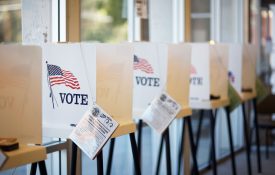-

Individuals’ Well-Being Linked With When and How They Manage Emotions
Using reappraisal to regulate our emotions in situations we actually have control over may be associated with lower well-being, researchers find.
-
How Superstitions Are Affecting Your Behavior
U.S. News & World Report: Are you spooked by Friday the 13th, black cats crossing your path or having to walk under a ladder? Do you often knock on wood after mentioning your good fortune or throw salt over your left shoulder after spilling it to ward off bad luck? If so, you're among the legions of people who are superstitious: A 2014 Harris Interactive/Statista survey of 2,236 adults across the U.S. found that 33 percent of people believe finding and picking up a penny is good luck, and 21 percent believe knocking on wood prevents bad luck. A previous Gallup news poll found that 25 percent of people in the U.S. say they are "very" or "somewhat" superstitious in general.
-
The Strange Tale of an X-rated Haunting
BBC: On the 28th May 1960, at precisely 7:40pm, AD Cornell valiantly attempted to ‘haunt’ a cinema audience who were sitting down to enjoy an X-rated film. Before emerging from the shadows, Cornell draped himself in a white muslin sheet, the fabric covering him from head to toe. He then emerged before the unsuspecting audience and was bathed in the light of projector. He moved in front of the screen, from the left edge to the right edge and back again. For Science! Cornell, a Cambridge-based parapsychologist, was conducting experiments in “apparitional experiences”.
-
A Scaredy-Cat’s Investigation Into Why People Enjoy Fear
The New York Times: Halloween is here again. That means your co-workers have planted surprise spiders around the office. You’ve been invited to a haunted hayride. Your neighbor’s yard has a full cemetery, rigged with motion detectors and pop-up zombies. Chicken-livered from the start, I have always dreaded this time of year. Haunted houses, ghost tours and horror film fests are not my thing, and why people love having the daylights scared out of them completely escapes me. ... Dr. Farley is interested in what draws certain people to extreme behaviors, like driving racecars, climbing Mount Everest and flying hot air balloonsacross oceans.
-

Using Science to Understand How Ballot Design Impacts Voter Behavior
Concern over the security of the voting process is a recurring issue, but psychological science suggests an even bigger problem may lurk within our voting systems: poor design.
-
Ready, Set, Type! Touch Typists Are Faster, But Not By Much
The first typewriter, invented by a newspaper printer and editor named Christopher Sholes in 1868, had a keyboard arranged like piano keys. Initially, the inventors thought that an alphabetical arrangement of 28 letters in a long row would be the most logical, easiest to use layout. However, after some experimentation, Sholes and his collaborators discovered that this arrangement wasn’t so efficient after all. In 1878, Sholes filed a new patent for the keyboard arrangement that most of us now rely for the bulk of our communications: the QWERTY keyboard. Exactly how Sholes arrived at this arrangement is still a bit of a mystery.

